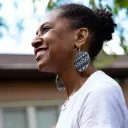Stay in the Loop
BSR publishes on a weekly schedule, with an email newsletter every Wednesday and Thursday morning. There’s no paywall, and subscribing is always free.
Follow your passion, but what's your second choice?
The fallacy of "The Voice'

My daughter Kiana is 16, so her future path is very much on my mind. I realize that the path is hers, not mine; I'm no helicopter mom. Neither am I interested in having her make my thwarted dreams a reality, since I already get paid to do what sane people call a hobby (playing the piano).
Still, I feel duty-bound to assist her by sharing what I've learned along the way. And since her fondest wish is to make a living as a singer, I think one of the most helpful things I can do is to kill her dreams.
I know that sounds horrible, but I can see that she's been infected by this society's embrace of positive thinking as a life strategy, and I think she needs an antidote.
Do what you love?
A recent "Saturday Night Live" sketch featured Melissa McCarthy as an aspiring entrepreneur who went to the bank to get a loan. She wanted to launch a pizza eating business, having bought the philosophy that if you do what you love, the money will follow.
The implication is clear: anyone can have a career doing what he or she loves most. You just have to follow your dream with unwavering determination. I'm glad to see someone ridiculing this idea, because it's lovely when it works out, but how often does that really happen?
I'm reminded of this fallacious notion every time I watch "The Voice." Watch is a strong word; mostly, I listen to a few minutes at a time while taking breaks from whatever task I should be performing. Still, I hear enough to know that the singers on that TV show are sometimes very, very good.
A number of them have already had careers— several were background singers for some very famous people (Judith Hill, for example, was rehearsing to perform with Michael Jackson in London when he died). A couple had been signed, then dropped, by record labels. All of them are doing what they love, many with no Plan B.
One winner. What happens to the rest?
So why do I watch? Because it's fun to see how many people are truly talented, and just as much fun to see the celebrity coaches interacting.
Fate of the losers
More than that, "The Voice" presents teachable moments. It gives my daughter a glimpse at the huge pond in which she hopes to become a big enough fish to avoid being eaten alive. The unsuccessful contestants are often urged not to give up on their dreams (no Simon Cowells here), but the facts are undeniable: Many talented aspirants, one winner, and all of them— including the victor— forgotten by the next season.
I do what I can to support my daughter, even as I try to impress upon her that very few people make careers as pop musicians; that even if they do, the success is often short-lived; and that even the most famous ones are branching out into other areas, like clothing and fragrance, because the music industry is so fickle and the record companies make most of the profits.
As a music teacher, I'll tell any aspiring musician with some talent the following: If you can think of something else to do, do that instead. But if you really, really need to find out if you can make it as a musician, pursue your goal while you're young so you don't wonder about it later on.
Juilliard beckoned
I'd be a hypocrite to advise others that way, and not share this well-worn wisdom with my own flesh and blood. And while I hope she does something else and uses her music as a hobby, who knows? Maybe she'll make it. Of course, if she does, she'll find out that all that glitters isn't gold, but she'll deal with that if the need arises. (I can't claim intimate knowledge of how one deals with fame anyway.)
Even though I know a great deal about being a musician, I auditioned in only one place for my undergraduate education (but since my teacher was on faculty, that was a shoo-in), and just one place for both my master's and doctorate degrees: Juilliard. Looking back, I realize how completely insane that was: I ended up being the only pianist Juilliard accepted for a doctorate for two years.
I'm making a living as a musician, occasionally getting paid to write— doing what I love, and earning enough money to scrape by. I'm grateful for what I have. But whenever Kiana questions my conclusions about the value of doing what you love without a back-up plan, I tell her to look at my beat-up van. And Kiana, the eternal optimist, assures me that she'll buy me a new one when she becomes famous. Sigh.♦
To read a response by Dan Rottenberg, click here.
To read other responses, click here.
Still, I feel duty-bound to assist her by sharing what I've learned along the way. And since her fondest wish is to make a living as a singer, I think one of the most helpful things I can do is to kill her dreams.
I know that sounds horrible, but I can see that she's been infected by this society's embrace of positive thinking as a life strategy, and I think she needs an antidote.
Do what you love?
A recent "Saturday Night Live" sketch featured Melissa McCarthy as an aspiring entrepreneur who went to the bank to get a loan. She wanted to launch a pizza eating business, having bought the philosophy that if you do what you love, the money will follow.
The implication is clear: anyone can have a career doing what he or she loves most. You just have to follow your dream with unwavering determination. I'm glad to see someone ridiculing this idea, because it's lovely when it works out, but how often does that really happen?
I'm reminded of this fallacious notion every time I watch "The Voice." Watch is a strong word; mostly, I listen to a few minutes at a time while taking breaks from whatever task I should be performing. Still, I hear enough to know that the singers on that TV show are sometimes very, very good.
A number of them have already had careers— several were background singers for some very famous people (Judith Hill, for example, was rehearsing to perform with Michael Jackson in London when he died). A couple had been signed, then dropped, by record labels. All of them are doing what they love, many with no Plan B.
One winner. What happens to the rest?
So why do I watch? Because it's fun to see how many people are truly talented, and just as much fun to see the celebrity coaches interacting.
Fate of the losers
More than that, "The Voice" presents teachable moments. It gives my daughter a glimpse at the huge pond in which she hopes to become a big enough fish to avoid being eaten alive. The unsuccessful contestants are often urged not to give up on their dreams (no Simon Cowells here), but the facts are undeniable: Many talented aspirants, one winner, and all of them— including the victor— forgotten by the next season.
I do what I can to support my daughter, even as I try to impress upon her that very few people make careers as pop musicians; that even if they do, the success is often short-lived; and that even the most famous ones are branching out into other areas, like clothing and fragrance, because the music industry is so fickle and the record companies make most of the profits.
As a music teacher, I'll tell any aspiring musician with some talent the following: If you can think of something else to do, do that instead. But if you really, really need to find out if you can make it as a musician, pursue your goal while you're young so you don't wonder about it later on.
Juilliard beckoned
I'd be a hypocrite to advise others that way, and not share this well-worn wisdom with my own flesh and blood. And while I hope she does something else and uses her music as a hobby, who knows? Maybe she'll make it. Of course, if she does, she'll find out that all that glitters isn't gold, but she'll deal with that if the need arises. (I can't claim intimate knowledge of how one deals with fame anyway.)
Even though I know a great deal about being a musician, I auditioned in only one place for my undergraduate education (but since my teacher was on faculty, that was a shoo-in), and just one place for both my master's and doctorate degrees: Juilliard. Looking back, I realize how completely insane that was: I ended up being the only pianist Juilliard accepted for a doctorate for two years.
I'm making a living as a musician, occasionally getting paid to write— doing what I love, and earning enough money to scrape by. I'm grateful for what I have. But whenever Kiana questions my conclusions about the value of doing what you love without a back-up plan, I tell her to look at my beat-up van. And Kiana, the eternal optimist, assures me that she'll buy me a new one when she becomes famous. Sigh.♦
To read a response by Dan Rottenberg, click here.
To read other responses, click here.
Sign up for our newsletter
All of the week's new articles, all in one place. Sign up for the free weekly BSR newsletters, and don't miss a conversation.

 Maria Thompson Corley
Maria Thompson Corley